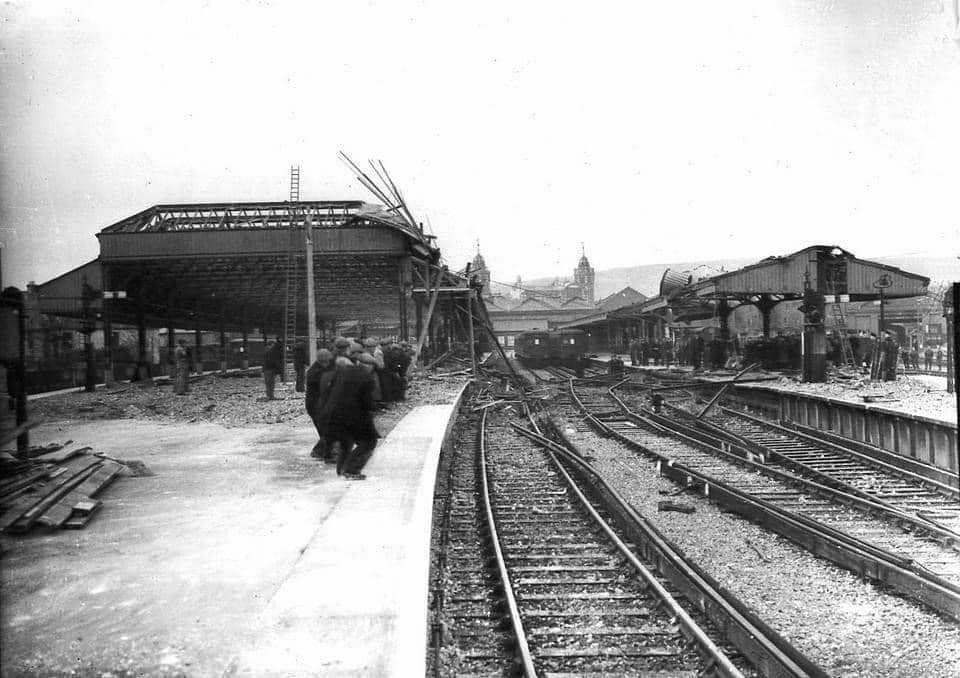
Southern Railway Magazine article Jan - Feb 1942
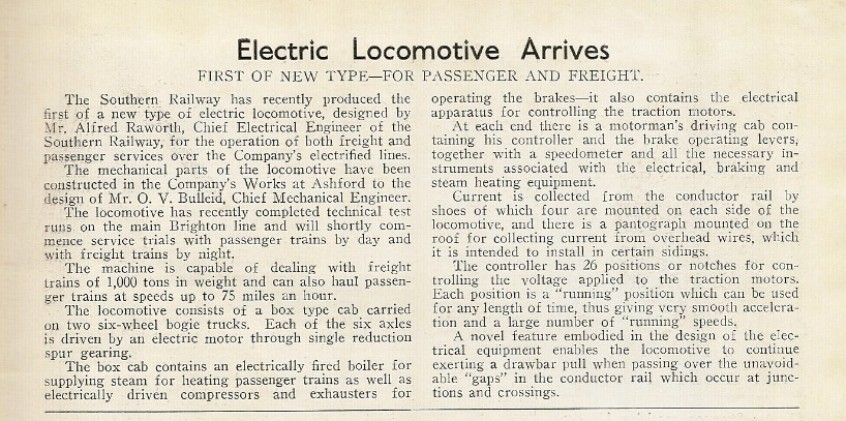
LOCOMOTIVE JOURNAL
JANUARY 1942
HORSHAM BRANCH
It is, I think, some time since an article appeared in the Locomotive Journal from this branch; nevertheless, we are very much alive-good attendance at the branch meetings, and still improving; one "non," one of the younger fraternity who sees no further than his nose. The L.D.C. are busy, being kept constantly at work. We have had the usual "shemozzle" with regard to the question of "firewatching," things not being worked fairly as they could be, the trouble apparently being the company's usual practice of putting square pegs in round holes. We have taken the matter up with divisional superintendent, and we hope that by the time this appears in print thats matters will be going more smoothly and the "chosen self exempted few" will find they will have quite a few turns of firewatching to do to catch up with the rest.
A little advice to our members re the 12 hours' rest clause. All men are entittled to 12 hours' rest, and if they have made overtime, they sign on again after having had 12 hours' rest. And if they have been informed that the rest period of the 12 hours' rest starts from when their eight hours was up, then they have been "bamboozled." Never
mind what turn you work or the number of hours that you do, see that you do not come in to work unless you have had the 12 hours' rest. This agreement is the finest one that you have, and make use of it.Wishing you all a Happy New Year, an d may the next one be a more prosperous one, and that we shall see the abolition of Facism and Nazism throughout the whole world.
R.T. TAYLOR.
Extracted and adapted from
Newhaven Branch Meeting
Sunday February 15th 1942
During discussing on the minutes item re the change of meeting day, Secretary explained arrangements made with the Secretary of the Labour Club and it was moved, that NO change in day time of place of meeting be made at present. Mention was made of item re working on Sunday following holidays , Bro. Rookley stated that in the proceedings at Southern District Council meeting this matter was discussed and that arrangements had been made between Society & Railway Companies, that men can be booked to work Sunday following holidays upon written notice being given to the men concerned before hand. Bro. Rookley gave a report of the meeting of S.C.Council meeting of February 9th 1942. with regards to staff being retained after 65 years of age this matter laid with the L.D.C. And the conditions obtaining at Depots concerned, and instances were given of Depots where men had been retired at 65.
Later Bro. Clarke proposed.
"That Bro. Rookley takes up the retention of men over 65 with a view to the principle of retirement taking place when due as at certain other Depots,”
Bro. Clarke further proposed.
"That Bro. Rookley take up with Mr. Urie on the subject of retirements at 65 as effects this Depot and if possible report back to the next meeting."
Bro. Rookley then went on to report on the concern being given to both the Society & the Company by the number of accidents, terminating fatally which have taken place recently, worst of which are caused by neglect and by inexperienced men and authorised persons moving engines in steam.
With regard to a discussion which ensued on Fire-watching,
Bro. Rookley stated that at many Depots, Fire-watching was not performed, except on a volunteer system, and a movement was being sponsored by the Society to obtain exception from Fire watching for all members of the Locomotive Staff if possible.
During further stage of Bro. Rookley's report he stated that in response to a question he put on behalf of Bro. W. Terrill. Bro. Bedwell of the S.R. Sectional Council state that a similar case to Bro. Terrill's' seniority was credited to the men concerned, but not any arrears of wages and that according by Bro. Terrill was receiving the same treatment as other men similarly placed. Bro. Rookley stated that men on going to pass the Company's Doctor some where being sent home on account of blood pressure, and asked that before the meeting closed a resolution be sent to Head Office from the Branch re this matter, the feeling of the S. C. Meeting being that this ailment is on the increase due to war conditions and the extra strain caused thereby.
Dealing with the application made by Bro. King, for the temporarily vacant position in 760, Bro. Rookley stated he had sought guidance, and Bros. Bedwell & Corke of Sec. Council stated that link working be unappointed men is worked out by the L.D.C of the Depot concerned by local agreement and as exception was taken by the Railway Company or the Sectional council to such working being put into operation. In reply to a question Bro. Rookley stated that the Company had the right to elevate men in Link working due to the War emergency and at this Depot a temporily vacant position now existed in 760 Duty.
It was proposed by Bro. W. Clarke & sec. By Bro. H. Hamblin.
"That Passed Firemen & Cleaners be booked Driving or Firing duties, nearest their rostered turn after any available job, where booked shall be filled by the senior men."
Carried.
Continuing his report, Bro. Rookley stated that Motormen at Victoria and Wimbledon had complained of rosters of 9, 9 ½ and 10 hours. The Company claimed that the men could not be supplied by the Loco Depts. The members of these two electric depots requested that it be taken up with the Company, that the staffing of the Electrical Depot be proceeded with.
Bro. Rookley concluded by saying that Bro. Sweeney intimated that the Society would no doubt be taking up the question of the soap ration with a view to obtaining an increase of soap for the benefit of our members.
In response to the quest for any other business Bro. Clarke requested Bro. Rookley to take up with Mr. Urie when next they meet the question of the number of men using the Loco Lavatories, some of whom came from the Marine shops and other nearby departments.
Bro. Rookley also quoted comments now being made of the Boiler Washer and Fitting Staff using the Enginemen's Lobby.
As a final item to the business Bro. Rookley proposed & Bro. W. Clarke seconded. That a resolution be sent to Head Office.
"That should a men be sent off duty by reason of blood pressure, the Society endeavour by all means, to obtain fall payment of wages for any such men, whilst he is so indisposed."
Carried.
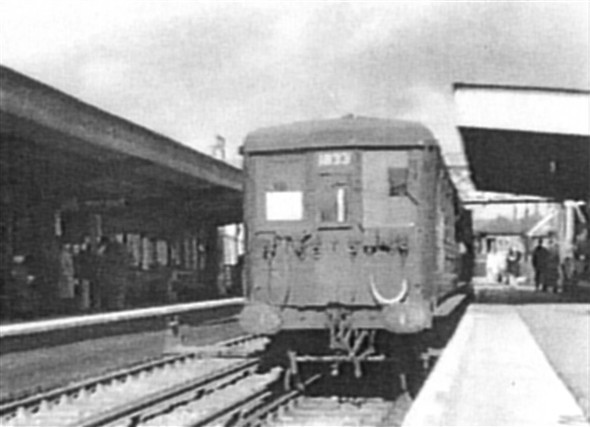
Richard Beckett Collection
The train that standing at Newhaven Town station
has protective mesh on the Motorman’s cab
windows with small cut out area to enable the Motorman to see
out off, the mesh was to prevent splintering in case of bomb
damage.
LOCOMOTIVE JOURNAL
MARCH 1942
HORSHAM BRANCH
Once upon a time, there were three bears - you've heard that one? Then there is the one about the firewatching meeting to be held at Horsham, promised by the Company, but who now state that it is not necessary, and when the firewatching agreements are 100 per cent. satisfactory, the choosen few that have self-exempted themselves will take part in the firewatching. "What's that, Brother?" you ask. "How can it be 100 per cent. satisfactory until they are doing their share?" Sh-sh-sh. You are not supposed to be intelligent enough to think of that. Wonder what they were affraid of that they could not keep faith with the men. It is all a matter of co-operation.
We have a notice posted, asking us to save as much oil and fuel as possible, another to contribute to the "Southern Fulmar." We have a notice-case made, ask for permission to place same in lobby, application definitely turned down. Wonderful stuff this co-operation, merely a matter of give and take. Yes, Brother, I heard you.
Our Russian comrades are still busy carving up the pork, and saving our skins; and just think, Brother, generals aged 30. There must be something in this co-operation business after all; perhaps they work it on both sides over there.
REG. T. TAYLOR
BOMB DAMAGE TO BRIGHTON SECTION OF THE SOUTHERN RAILWAY
Eastbourne Monday 4th May 1942
Eastbourne Thursday 7th May 1942
Galley Hill (Bexhill) Tuesday 9th May 1942
Involving the 6.5 a.m. Ore to Brighton
Brighton Monday 18th May 1942
In June 1942 the War Advance was increased by 5s per week although this did not
cover the increase in the cost of living the War was causing.
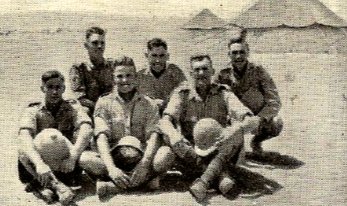
Back Row L~R: B.P. Pope, H. Bowers (Nine Elms), & F. Harding
(Salisbury).
Front Row L~R: S. Reeves (Brighton Driver), H. Kent (Salisbury)
& H. Upton (Eastbourne Driver).
They all volunteered for the Military Police at the outbreak of the
war and are photographed somewhere inthe Middle East.
Southern Railway Magazine
Sept/Oct 1942
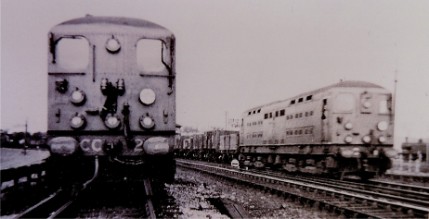
PHOTOGRAPHER UNKNOWN
Above
Southern Railway's all electric locomotives CC1 & CC2 seen shortly after entering
service at Three Bridges working a down goods train down towards Horsham
Externally, it was clear the cab design owed a lot to Southern experience with the 2 HAL
multiple unit design. It has even been suggested that (in true Southern tradition) this was
because the jigs for the welded cabs already existed and thus made for speedy and cheap
construction. At the outbreak of war in 1939, most construction projects were put on hold in
favour of the war effort. Construction of CC1 and CC2 was exempted from this because of
promised savings in labour and fuel over steam locomotives. Construction was not smooth
however and was brought to a halt several times due to shortage of resource.
After nationalisation in 1948, British Railway renumbered them 20001 and 20002
respectively. Also a third member of the class (20003 from new) was built at Brighton.
Although counted as the same class, 20003 was markedly different externally to its two
earlier sisters being 2 inches longer with flat 4 SUB like cab ends. Again a suspected
economy drive and arguably simpler (and therefore cheaper) design than the earlier two.
Equipment changes also added 5 tons to the earlier 100 ton design.
BOMB DAMAGE TO BRIGHTON SECTION OF THE SOUTHERN RAILWAY
Littlehampton Sunday 9th August 1942
Eastbourne Tuesday 11th August 1942
Bognor Regis Friday 14th August 1942
Fratton Wednesday 19th August 1942
Eastbourne Wednesday 16th September 1942
PHOTOGRAPHER UNKNOWN
Eastbourne station 16th September 1941
Lancing Works Wednesday 30th September 1942
Brighton Monday 12th October 1942
Seaford Wednesday 4th November 1942
LOCOMOTIVE JOURNAL
SOUTHERN RAILWAY ELECTRIC ENGINE C.C.1.
Arising from the policy which has been adopted in connection with the working of this engine, an agreement has now been reached with the representatives of the Southern Railway Company, by which this engine will be confined to the working of unbraked freight trains, and it will by manned by two men, one a Motorman, and another an Assistant Motorman, both of whom will be in the line of promotion. the agreement reached precludes this or any similar type of engine from being worked with one man only, and will remain in operation during the period of hostilities.
MANNING OF ELECTRIC LOCOMOTIVE CC1
A.S.L.E.F.’s 1942 A.A.D. RESOLUTION
Interest was aroused by, and discussion was heated on, an Electric Engine put into traffic by
the Southern Railway and known as the CC1. The long discussion by the delegates centred on the fact that the Southern Railway proposed to work this Engine with one man in charge. There was tremendous opposition to this on all counts as we considered it a direct violation of the safety code to have a single person in charge of such a machine on the head of passenger trains. So serious was the view the Delegates took of this matter that the Executive Committee received instructions that if the Southern Railway carried out their intention of manning the CC1 with one man an immediate strike should be called. It only remains to be said that this drastic threat was never put into operation since the Southern Railway agreed to work the CC1 on freight traffic under the charge of 2 men after representation by our society.
Taken from “The Lighted Flame”
ASSOCIATED SOCIETY OF
LOCOMOTIVE ENGINEERS & FIREMEN
Ref no. 43/1945
25th August 1945
To Branches
Southern Railway
MANNING OF ELECTRIC LOCOMOTIVE - SOUTHERN RAILWAY
As you are no doubt aware a number of complaints have been received
from time to time regarding the manning of the Electric Locomotive on
the Southern Railway, and the position has been raised in discussion
with the Company.
The Executive Committee have recently given further consideration to
the subject, and arising therefrom the Company having been informed
that in all cases where the locomotive is place in service, we could
only agree that it should be manned by two men in the recognised Line
of Promotion, i.e. two Motormen, or a Motorman and Assisting Motorman.
In order to safeguard against future eventualities I shall be glad if
you will advise me immediately there in any departure from this
working, and in this event I shall be glad if you will send the
fullest possible information to this Head office.
Thanking you to bring this to the notice of your members.
On behalf of the Executive Committee,
Yours fraternally,
W. P. Allen
General Secretary
Railway accident on the
Southern Railway
Brighton Section
LOCOMOTIVE JOURNAL
NOVEMBER 1942
Editor's notes
"It is of more than a little interest to hours of normal railway work that they find that at long last the attention which we have attempted to direct to the grow- shall perform each week.»
ing adverse effect of the shortage of manpower on railways is now being re-echoed in other quarters. It will be generally known that some of us have been claiming that the transport industry stands second to none in importance in its association with the general war ef-fort, and to denude the industry of its essential manpower serves the country no good
We recognise the importance, indeed the very great importance, of sufficient manpower being provided for the mining industry, but it is difficult to understand why men should be transferred from such an industry equally impor-tant, such as our own, in order to ease the position in the mines and thus merely move the embarrassment of the difficulty from one point to another.
With the general shortage of man-power, meaning longer hours of employment, especially during the winter months, we are entitled to ask how long it is expected that this will go on. If men must spend so many hours per month of their spare time in the Home Guard or in part-time Civil Defence duties, then we shall need to consider putting a limit on the number of
"It is of more than a little interest to hours of normal railway work that they find that at long last the attention which we have attempted to direct to the grow- shall perform each week.
LOCOMOTIVE JOURNAL
DECEMBER 1942
HORSHAM BRANCH
The October meeting was an event for us at Horsham, as we had the pleasure of the company of the General Secretary, Mr. W.P. Allen, who addressed the meeting and dealt very fully with all the latest developements, and answered questions to the satisfaction of all concerned. This was the first time that our General had been to Horsham, and he can be assured of a very warm welcome at any time in the future.
We were pleased to members from Chichester, Redhill and Three Bridges.
Attendance continues to be good in the branch room. No election necessary for the next L.D.C., and wonders will never cease - a vote of appreciation recorded to the L.D.C. for the splendid work performed by them.
I will take this oppirtunity of wishing everyone a Hapy Christmas and a prosperous New Year, when, let us hope, we shall see the commencement of the "winning of the case."
REG. T. TAYLOR
Wednesday 16th December 1942
Train under enemy attack at Bramley & Wonersh Station
Involving Horsham Driver George Budd
and his Fireman William Fairey
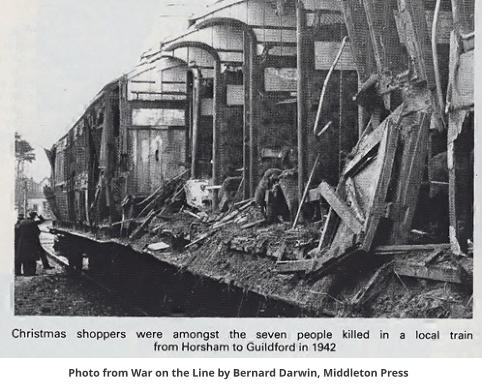

On Wednesday 16th December 1942, a two coach push and pull train carrying Christmas
shoppers from Guildford had just pulled out of Bramley & Wonersh station when it was
attacked by a single Dornier 217 aircraft. The plane machine gunned the train and reportedly
dropped three bombs one of which exploded on the embankment. 36 people were injured and seven people lost their lives.
Horsham Fireman William Fairey and station porter in charge Violet Wisdom attended the
wounded and dying, later helped by six soldiers who were billeted nearby. Afterwards
William Fairey and Violet Wisdom were presented with certificates of merit for their actions, and Violet was singled out for her “great courage and resource directly the bombs had fallen”.
The plane then flew on to Guildford railway station.
HORSHAM BRANCH REPORT APPEARS IN
THE FEBRUARY 1943 EDITION OF THE LOCOMOTIVE JOURNAL
